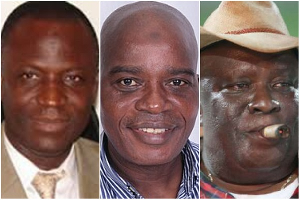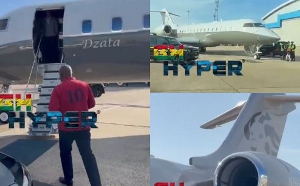A Layman’s View Based On ‘Commonsense’
By Otchere Darko
The view is widely held among economists and laymen alike that governments in third-world countries are justified in resorting to borrowing to address the heavy infrastructural deficiencies in such countries. For this reason, even third-world governments formed by right-wing parties that normally believe in private-led development agendas borrow heavily to undertake government projects, instead of leaving such projects to private sectors to undertake with private finance. However, we all know that all loans, including those that have their repayments spread over long periods, have painful costs. Externally sourced loans in particular have numerous painful costs, including political costs such as the loss of a country’s independence and sovereignty. That, heavy public debt in any country is economically regressive and unhelpful, does not need emphasis. Japan is one economy that came close to collapse some years back, because of that country’s heavy public debt. The Irish Republic has ceased to be the “new bustling economy of Europe”, because of heavy public debt that has forced that country to get on its knees and beg for EU bail-out. Greece has twice been forced to seek EU bail-out on unpalatable terms. Spain, Portugal, Italy and the United Kingdom are all struggling to control their public debts and save their economies from defaulting and plunging themselves into humiliating debt crises. In USA, strenuous congressional efforts are being made this very day of writing this piece, [25th July 2011], to save the largest economy in the world from going down the shameful road of public debt default. If public debt is, or can be harmful to countries, why do governments push their economies down that dangerous path?
In most Western countries, it is mounting pressure on public outlays like social security benefit payments and heavy military budgets arising from foreign military engagements, compounded by the recent heavy government interventionist programmes necessitated by the 2008 credit crunch and the resultant economic down-turn that hit Western economies hardest, that has built up to account for the increasing public debts and the crises they have generated in those economies. In Ghana, governments, both capitalist and socialist-oriented, talk about “borrowing for infrastructural development”. In the eyes of our politicians, the term “borrowing for infrastructure” can mean anything from “borrowing to renovate a Minister’s office” to “borrowing to provide public toilets” in Accra. This is why some of our politicians justify the borrowing of money from foreign governments and institutions to either “construct a presidential a palace” or “buy a presidential jet”. This is also why some politicians think that it is justified to borrow huge foreign money to build residential accommodation through a foreign building contractor for policemen and policewomen in Ghana who spend most of their working hours hiding along roads and demanding bribes from offending drivers. And that, also, is why the current government is borrowing to buy five aircrafts for air force men and women who have no current military engagements that warrant the use of aircrafts. Theoretically, the government of US can default on its debt payment. However, we all know that the world’s biggest economy would find a way to raise money any time to meet its national needs and avoid default, if the situation demanded it, despite the usual partisan wrangling that characterises Republican and Democratic congressional exchanges. We also all know that the EU will never allow any member country in Europe to default completely on its debt obligations. This means that America and Europe have “standby mechanisms” to deal with debt crises that affect them, despite any hullabaloos such crises generate from time to time. On the other hand, neither the AU nor ECOWAS can assist any African or West African country that finds itself in any severe debt crisis. Why then do Ghanaian political leaders of today behave so stupidly by “borrowing and borrowing”, when it is so clear that excessive borrowing that leads to the accumulation of huge government debts is suicidal for any African country? Why is Mills destroying Ghana through debt accumulation, when we do not need to borrow money to finance many of the expenditures his government is wasting money on?
*Sensible Borrowing And Spending:- You and I know that it is sensible for Ghana government to borrow money, for example, to build the infrastructure needed to enable the country to drill and market its recently discovered oil. You and I know that it would be sensible also if the government were to borrow huge money to restore Ghana’s rail network from Sekondi-Takoradi in the West to Kumasi in the Ashanti Region; and from Kumasi to Accra and Tema in the South-East; as well as to extend the railway lines from Kumasi to Sunyani, to Tamale, to Bolgatanga and other towns in the two Upper Regions of Ghana. You and I know that it would also make sense if our government were to borrow money to build International Airports at Sunyani, Tamale and Bolgatanga, or elsewhere in the two Upper Regions. You and I know that it would have made sense if our government were to borrow money to build classrooms for the many schools that conduct classes under trees, as well as to build residential flats for teachers and nurses who are posted to the Northern and the two Upper Regions of Ghana, where decent accommodation and other social amenities are lacking. *Few Ghanaians would complain if the government borrowed money to do any of the things mentioned in this very paragraph.
*Stupid Borrowing And Spending:- However, you and I know that governments in Ghana since our Fourth Republic have borrowed and used foreign loans only for reasons of improving their party’s electoral chances, as well as for satisfying their [politicians’] individual private pecuniary needs. What some of us don’t understand is why a Ghanaian government should borrow money to build a presidential palace, and for the place to be unused after it is finished. What some of us also do not understand is why a Ghanaian government should borrow money to buy five aircrafts for an Air force that is not engaged in any battle at the moment, and at a time when some school children attend classes under trees in parts of Ghana. What fails most to make sense to Ghanaians is the “Ministerial explanation” that the aircrafts will be used to hunt for criminals like armed robbers. Is it these types of aircrafts that are used in all other countries to hunt for criminals? Or is it helicopters that are used to search for criminals? Does it also make sense to borrow money to give to a foreign contractor to build residential accommodation for security men and women who contribute very little towards the nation’s progress..... when tomorrow’s leaders and builders of the nation do not have classrooms to study to become the future good leaders and builders we expect them to be? And what about the denial of the opportunity for Ghanaian contractors to build such houses, since it is Ghana government that has used its oil to guarantee the loan to be used for the project, apart from the fact that it is the Ghanaian tax-payer that is going to pay the loan to be used to finance these houses to be built and given to Security personnel as “government’s election bribe”? Is it not self-insulting and hypocritical for the so-called “social democratic” government of Mills to argue that Ghanaian contractors could not be trusted to build such houses, or whatever their excuse was?
We, Ghanaians, should open our eyes and see what is happening in Ghana. We, Ghanaians, should learn the bitters lessons from the debt crises that are going on in the richer countries of the West. You and I, the poor people on the streets of Ghana, should wake up and act now to stop the excessive borrowing going on in Ghana now, and the wasting of such borrowed monies on useless things at a time when [some] Ghanaian schools continue to hold classes under trees. “Third parties”, like the CPP, the PNC, small though they may look today, should act now to save Ghana from excessive and irresponsible borrowing and wasting of borrowed monies on senseless expenditures. It is when these currently small parties make their protests heard over the way the dominant parties are handling Ghana’s economy and economic affairs that they, the small parties, can win the admiration and sympathy of Ghanaians and gain their votes, come next year. Let the CPP, the PNC and other small parties formed ,or yet to be formed join the call for Mills’ NDC to stop spending Ghana’s scarce future resources on servicing of debts arising from loans contracted to finance useless public expenditures, such as the planned purchase of five aircrafts for a peace-time Ghana air force at a time when many schools in our country hold classes under trees for school children in modern-day Ghana, the first country South of the Sahara to gain political independence on the continent.
Source: Otchere Darko; [This writer, {who is not the same as Gabby Otchere-Darko}, is a centrist, semi-liberalist, pragmatist, and an advocate for “inter-ethnic cooperation and unity”. He is an anti-corruption campaigner and a community-based development protagonist. He opposes the negative, corrupt, and domineering politics of NDC and NPP and actively campaigns for the development and strengthening of “third parties”. He is against “a two-party only” system of democracy {in Ghana}....... which, in practice, is what we have today].
Opinions of Tuesday, 26 July 2011
Columnist: Darko, Otchere














